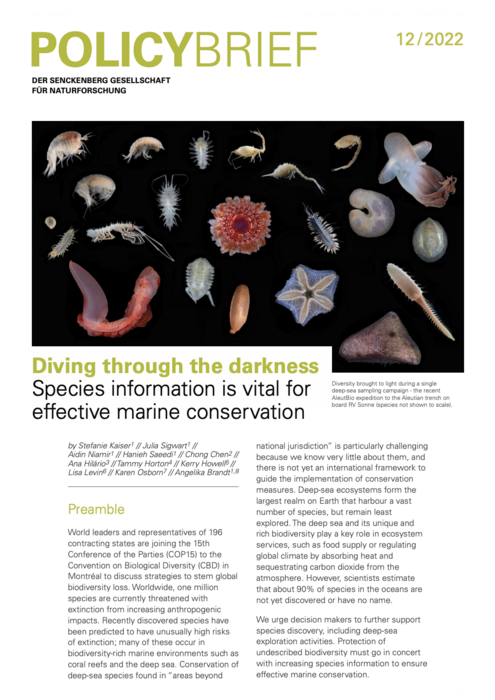More than 90% of marine species are undescribed and many may go extinct due to human activity before they’re discovered — the loss of unique, potentially valuable genetic resources resulting in unpredictable effects on global ecosystems essential to human food supplies and climate regulation.

Credit: Senckenberg Research Institute and Natural History Museum
More than 90% of marine species are undescribed and many may go extinct due to human activity before they’re discovered — the loss of unique, potentially valuable genetic resources resulting in unpredictable effects on global ecosystems essential to human food supplies and climate regulation.
Without knowledge of these species, effective deep sea conservation is impossible, leading international marine scientists warned in a new policy brief presented at the UN Biodiversity Conference (COP15) today in Montreal.
They urge global policy-makers to support urgently needed new research to fill a critical knowledge gap.
While roughly 28,000 deep-sea animal species have been described and named, an estimated 2.2 million other marine species, including deep-sea, are unknown to science, of which many are thought to be threatened with extinction.
In 2019, the Scaly-foot Snail (Chrysomallon squamiferum) became the first deep-sea species listed as globally endangered due to the threat of deep-seabed mining.
“Conservation of deep-sea species found in ‘areas beyond national jurisdiction’ is particularly challenging,” the policy brief says.
“We know very little about them, and there is not yet an international framework to guide the implementation of conservation measures,” says lead author of the brief, Dr. Stefanie Kaiser of the Senckenberg Research Institute and Natural History Museum, Frankfurt.
Knowledge of deep-sea species biodiversity is an obvious first step to effective protection of both the species and the ecosystem processes associated with them.
The scientists warn that deep sea species are increasingly exposed to pollution and habitat destruction.
In particular, global warming, ocean acidification and resource depletion could lead to dramatic changes in deep-sea biodiversity with unpredictable consequences for humans as well.
The scientists call for support to develop international research strategies, infrastructure, cooperation and exploration.
“Deep-sea areas seem very distant and insignificant at first glance; it’s not immediately clear what this vast ecosystem and its inhabitants are doing for us,” explains Dr. Kaiser.
“The deep sea — defined as 200 to 11,000 meters depth and beyond — is the world’s largest habitat, covering more than half of earth’s surface. It is essential to global climate regulation by storing carbon dioxide and heat and by maintaining biodiversity.”
Dr. Kaiser’s co-authors are Senckenberg colleagues Drs. Angelika Brandt, Julia Siegwart, Aidin Niamir and Hanieh Saeedi.
They were joined by researchers from
- the Japan Agency for Marine-Earth Science and Technology (JAMSTEC),
- the Portuguese University of Aveiro,
- the National Oceanography Center in Southampton and the University of Plymouth in the UK
- the US Scripps Institution of Oceanography and
- the Smithsonian National Museum of Natural History in Washington D.C.




